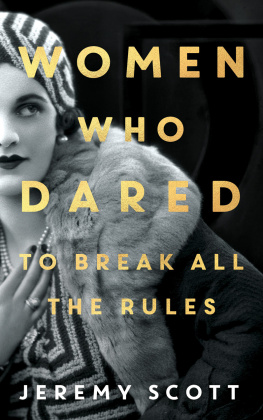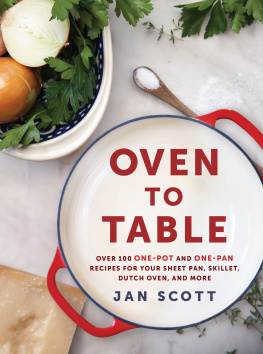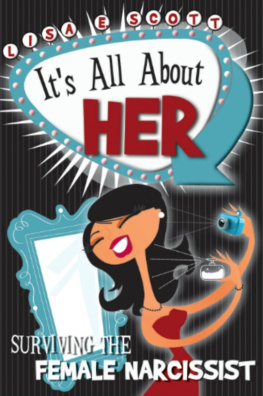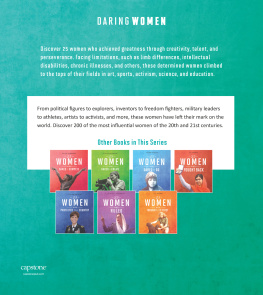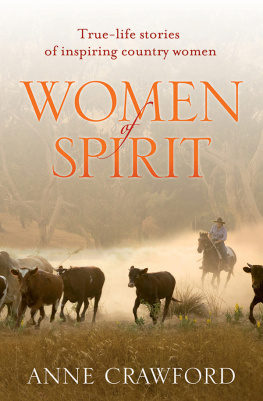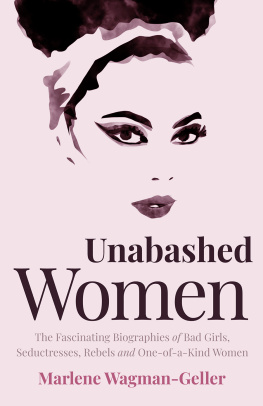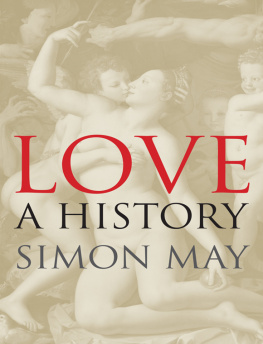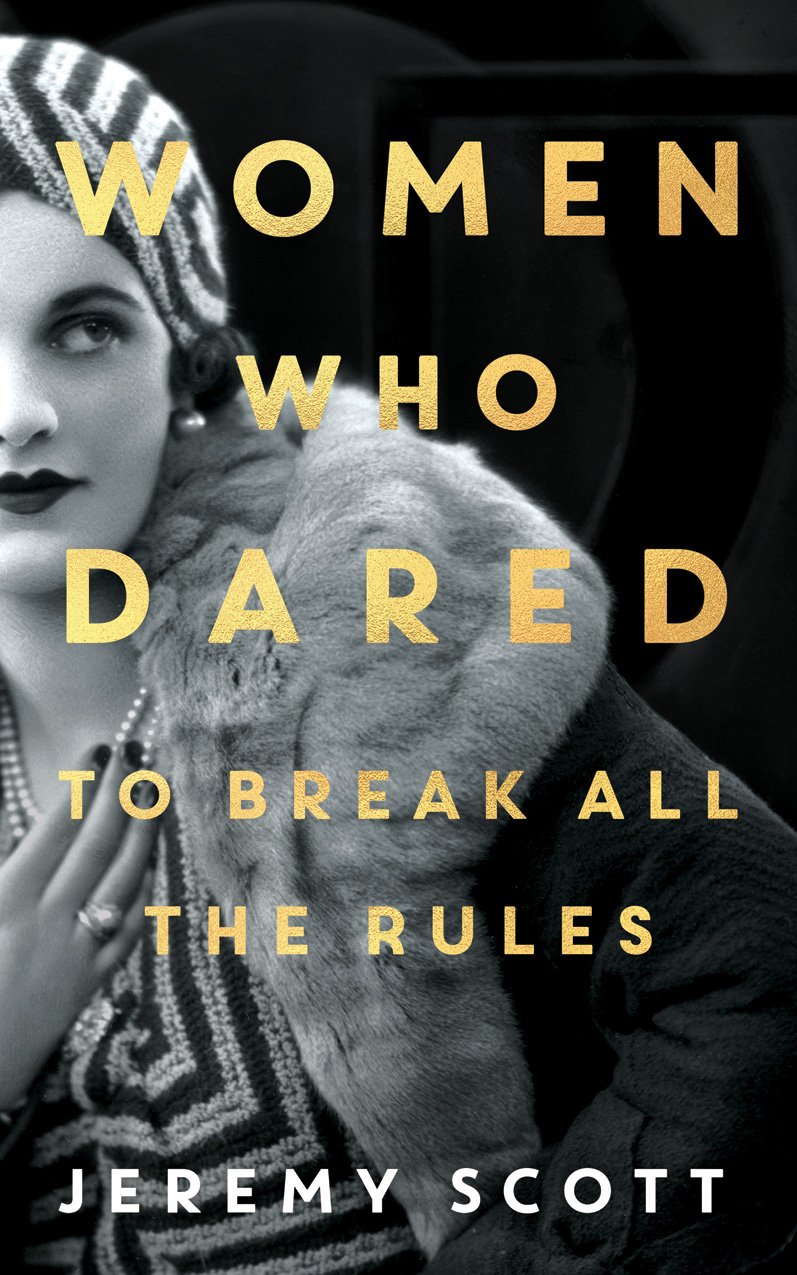PRAISE FOR WOMEN WHO DARED
Simultaneously an exuberant celebration of lives lived at full throttle, and a collection of cautionary tales. In the nineteenth and twentieth centuries, six transgressive women achieved fame or notoriety (often both in quick succession) by breaking societys strictures in order to make up their own rules. Women Who Dared explores the vivid personalities and various motivations of Victoria Woodhull, Mary Wollstonecraft, Aimee Semple McPherson, Edwina Mountbatten, Margaret Argyll and Coco Chanel, dynamic women whose lives spanned several continents and many decades. It reads as an engaging and often witty celebration of rugged individualism and outright eccentricity, and explores the exertion of soft power in an age when careers for women were largely limited to making a good marriage, and keeping out of the papers. Jeremy Scott, who is also the author of The Irresistible Mr Wrong, is adept at detailing how many of these women fell for successive rotters, but nevertheless treats his subjects with genuine warmth, humour and insight. It can be lonely to be a pioneer, observed Nancy Astor, and Jeremy Scott captures that sense of determination, drive and resilience in this enjoyable biography of six remarkable, groundbreaking women.
Sin Evans, author of Queen Bees
Jeremy Scott, a man who clearly loves women, is awed by the exploits of these outrageous rule-breakers. Me too. Its a great read.
Marcelle dArgy Smith
Hugely enjoyable and a sparkling addition to the genre
Katie Hickman
Also by Jeremy Scott
Fast and Louche
Dancing on Ice
Show Me a Hero
The Irresistible Mr Wrong
Women Who Dared
To Break All the Rules
Jeremy Scott

To Sasha and Daisy, in admiration
CONTENTS
PREFACE
It probably seems strange that at this moment I have chosen to write about these independently minded women.
Since I got my first job in advertising in the 1960s, Ive been surrounded by women who were quicker and smarter than their male counterparts, and I found them much more fun to be around.
I have always been attracted to rule-breakers, and in particular women with a streak of daring, and my book was always intended as a homage to and a celebration of these women who, despite everything, really did change the culture we live in.
MRS SATAN: PRESIDENTIAL CANDIDATE
She was the best of womankind; she was the worst. She was a shameless adventuress, or a pioneer who broke the trail for her sex. Some denounced Victoria Woodhull as a prostitute, others claimed she had power from the Evil One to cast spells particularly over men. She was reviled or exalted, either damned or applauded as an inspiration to every woman. Her opponents wanted to see Victoria burned at the stake, but her courage and will were undeniable. For the domesticated masses yearning at the kitchen sink of heartland America in the 1870s, she gave voice to a dream of liberty.
Victoria Woodhull and the lineage of bold women in this book form a rare species; they possessed a priceless gift personal charisma. From infancy they displayed a power that made them utterly different to other people. Charisma is a quality elusive to pin down, but you recognise it instantly on meeting and react to its effect. It radiates a force that enables its owner to get away with actions that others cannot. As these women demonstrate, in a manner that seems at times almost supernatural.
Victoria was born one of thirteen children in a shack in the backwoods of Ohio. She received almost no schooling; yet at the age of thirty-four she stood for the Presidency of the USA. Due to one egregious impediment, she failed to fulfil the American Dream.
She launched her campaign with defiance: All this talk of womens rights is moonshine. Women have every right. They have only to exercise them. Thats what were doing
For half the population of the country this was flagrant heresy women should be brought up to know their place and most of the other half agreed with this verdict, or found it expedient to say so. For the rest she lit a candle in the dark; she spoke the unsayable. But there was more to follow. Rejoicing in the outrage she incited, Victoria then went further, much further:
First Proclamation
While others argued the equality of women with men, I proved it. While others sought to show that there was no valid reason why women should be treated as inferior to men, I boldly entered the arena. Having the means, courage, energy and strength necessary for the raceI now announce myself candidate for the Presidency of the United States of America.
Such was Victorias announcement of intent, which she ended with a postscript, I expect criticism.
Criticism is much too mild a word for what she did receive. She got abuse, ridicule, vilification and death threats. People spat at her in the street. The February 1872 edition of Harpers Weekly ran a cartoon of the deplorable Third Party candidate who had the barefaced cheek to run for the Presidency.
Victoria, portrayed with a scowl and Devils wings, displays a poster preaching FREE LOVE. Along with her ambition to govern the country shed taken up a cause very contrary to the moral climate of the time: everyone, married or not, had the right to engage in sex with any willing partner they chose. Behind the diabolic image of Victoria in the poster, in the background, Mrs Everywoman can be seen toiling up a steep, rocky path, an infant tied to her waist, carrying on her back an incapable drunken husband. The caption: GET THEE BEHIND ME MRS SATAN. Id rather travel the hardest path of matrimony than follow in your footsteps.
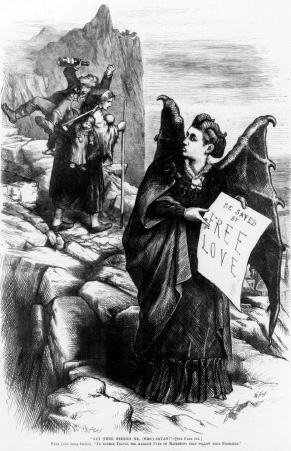
* * *
In Woodhull & Claflins Weekly, the five-cent magazine Victoria had started with her sister Tennessee two years earlier, Free Love had been the first of the many causes she chose to promote. Free Love featured in her manifesto and campaign speeches. Her other policies womens suffrage, equal pay for the sexes, workers rights, trade unions, nationwide healthcare, abolition of the death penalty and an end to the slavery of marriage proved no less incendiary to a male electorate. She was armed to confront its ranks. Along with looks and a charismatic presence, Victoria possessed a further strength: she was a mesmeric speaker. She connected instantly with her audience, it was impossible to disregard her. She conveyed a passionate sincerity, and evoked raw emotion in her hearers. Expressed in adoration or odium, the crowds response to her was tangible. Many of her meetings ended in such uproar that it required police to disperse the warring factions.
Among young disaffected women in America and at the time there was a great deal for young women to be disaffected about she won the hearts and minds of many delirious supporters. Older, married women abhorred her views. Except for a few independent-minded males, men universally condemned her; the mayor of Boston banned her from speaking in the city. For newspapers, the only form of media in that period, she was a gift. She provided the stories they most valued: scandal and infamy. The press united in damning her, together with every plank of her election campaign and aspect of her character.
All publicity is good publicity; it breathes life into its offspring. Woodhull & Claflins Weekly

